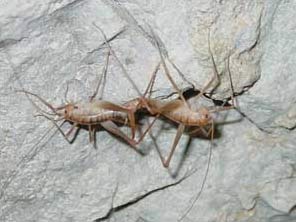New Genus of Cricket Found in Arizona Cave

Get the world’s most fascinating discoveries delivered straight to your inbox.
You are now subscribed
Your newsletter sign-up was successful
Want to add more newsletters?

Delivered Daily
Daily Newsletter
Sign up for the latest discoveries, groundbreaking research and fascinating breakthroughs that impact you and the wider world direct to your inbox.

Once a week
Life's Little Mysteries
Feed your curiosity with an exclusive mystery every week, solved with science and delivered direct to your inbox before it's seen anywhere else.

Once a week
How It Works
Sign up to our free science & technology newsletter for your weekly fix of fascinating articles, quick quizzes, amazing images, and more

Delivered daily
Space.com Newsletter
Breaking space news, the latest updates on rocket launches, skywatching events and more!

Once a month
Watch This Space
Sign up to our monthly entertainment newsletter to keep up with all our coverage of the latest sci-fi and space movies, tv shows, games and books.

Once a week
Night Sky This Week
Discover this week's must-see night sky events, moon phases, and stunning astrophotos. Sign up for our skywatching newsletter and explore the universe with us!
Join the club
Get full access to premium articles, exclusive features and a growing list of member rewards.
In a rare type of discovery, researchers have identified a whole new genus of cricket in caves in Grand Canyon-Parashant National Monument in northwestern Arizona.
The discovery was made by Northern Arizona University doctoral candidate J. Judson Wynne and National Park Service researcher Kyle Voyles.
The new genus has yet to be named. It was identified by cricket expert Theodore Cohn of San Diego State University.
What's different
Most crickets have a pair of non-clasping cerci at their hind ends. Earwigs have cerci, which are commonly known as pinchers. The newfound genus has cerci that do clasp, Wynne said in a telephone interview.
The plate that covers its reproductive zone is also unlike any known on other crickets, he said.
Cave crickets tend to sleep and reproduce in the cave but go outside to feed at night. It is not known if the newfound critters live that way, but Wynne suspects they do, having found them during the day near the cave entrance in semi-darkness.
Get the world’s most fascinating discoveries delivered straight to your inbox.
"I don't think there's enough food there to support the crickets," he said. "I think they come out to feed."
Much to learn
The finding suggests there's a lot more to discover in Southwest caves.
Of more than 1,000 known caves in Arizona, only 3 percent have been significantly surveyed by biologists.
"Cave ecosystems are one of the most poorly understood and fragile ecosystems," Wynne said. "The discovery of a new cricket genus from a northwestern Arizona cave emphasizes how little is known about these ecosystems."
A genus is a major subdivision within a family of living things that typically includes more than one species. The newfound crickets belong to the Rhaphidophoridae family, which is within the order called Orthoptera. This order also includes grasshoppers.
Neil Cobb, curator of the Colorado Plateau Museum of Arthropod Biodiversity, said the discovery of a new genus in such a well-known order in North America is rare.
"Caves are one of the final frontiers in temperate regions for discovering new taxa," Cobb said today. "Because caves are extreme environments, cave arthropods are very specialized and possibly endemic to a single cave system or region. They present interesting and odd evolutionary forms that reflect the extreme environments found in caves."
- Wandering Cave Crickets
- Secret Weapons: Defenses of Small Creatures
- Well-fed Crickets Seek Sex Incessantly, Die Young
- Explorers Discover Huge Cave and New Poison Frogs
- 27 Unknown Creatures Found in California Caves
- GALLERY: Spiders
Robert is an independent health and science journalist and writer based in Phoenix, Arizona. He is a former editor-in-chief of Live Science with over 20 years of experience as a reporter and editor. He has worked on websites such as Space.com and Tom's Guide, and is a contributor on Medium, covering how we age and how to optimize the mind and body through time. He has a journalism degree from Humboldt State University in California.
 Live Science Plus
Live Science Plus











